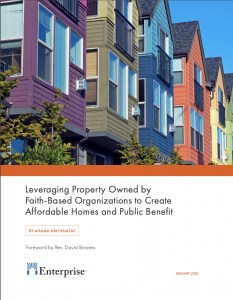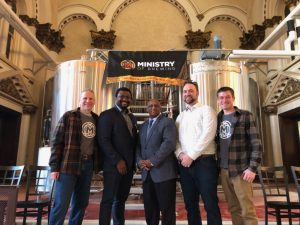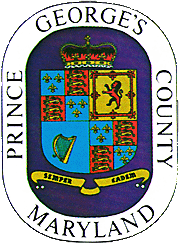February 12, 2020

David Bowers (l), Vice President and Mid-Atlantic Market Leader and Ahmad Abu-Khalaf (r), Senior Research Analyst, Public Policy at Enterprise Community Partners.
HAND members are consistently striving to move the needle on the growing housing affordability challenge. “Five Minutes With” is a series highlighting the great work that our membership is doing across the region. This informal conversation asks HAND members about their recent projects, the affordable housing industry and more. In the latest edition, we have a dialogue with David Bowers, Vice President and Mid-Atlantic Market Leader and Ahmad Abu-Khalaf, Senior Research Analyst, Public Policy at Enterprise Community Partners.
Abu-Khalaf recently authored Enterprise’s report titled, Leveraging Property Owned by Faith-Based Organizations to Create Affordable Homes and Public Benefit. The rising acquisition cost of developable land, among other factors  like the rise in construction material costs and shortage in skilled construction labor, has been driving the cost of residential development, impacting developers’ ability to create affordable homes. Through effective partnerships and informed decision-making processes, faith-based organizations (FBOs) who own underutilized or vacant property are able to repurpose their property to create affordable homes and public benefit. This publication assists FBOs and community stakeholders interested in advancing this strategy with understanding what it takes to successfully and effectively implement this solution and the different implementation approaches that can be pursued.
like the rise in construction material costs and shortage in skilled construction labor, has been driving the cost of residential development, impacting developers’ ability to create affordable homes. Through effective partnerships and informed decision-making processes, faith-based organizations (FBOs) who own underutilized or vacant property are able to repurpose their property to create affordable homes and public benefit. This publication assists FBOs and community stakeholders interested in advancing this strategy with understanding what it takes to successfully and effectively implement this solution and the different implementation approaches that can be pursued.
Bowers launched Enterprise’s Faith-Based Development Initiative (FBDI) in 2006, which brings technical assistance and financial tools to help religious institutions develop their underutilized land into new housing and community facilities or acquire existing housing to ensure long-term affordability. Enterprise has invested more than $154.8 million in grants, loans and equity with houses of worship across the region, resulting in the creation and preservation of over 1,300 affordable homes and one community-based health center with another 1,000 homes in the development pipeline. The FBDI has provided training and informational workshops to hundreds of houses of worship and faith-based organizations in the region. Enterprise has expanded FBDI work nationally, with efforts taking place in cities including Baltimore, Denver, Miami and New York.
Check out our conversation with David & Ahmad here:
HAND: FBDI was established in 2006 and is still very relevant today. Can you provide a little background on how it started and why it’s important?
DB: The Enterprise Faith-Based Development Initiative was started because of our awareness of an acute need for the development of new homes affordable to low-and moderate-income residents in the DMV region. The DMV was and continues to be one of the highest cost real estate regions in the country. Land costs are high and the availability of land for new construction is limited. We knew about the extensive amount of land owned by houses of worship that could potentially be activated for the development of affordable housing and community serving facilities. In 2006 we spoke with Dr. Sam Marullo, who at the time was at Georgetown University doing research on land owned in parts of DC by houses of worship. Rev. Donald Isaac at East of the River Clergy, Police, Community Partnership was also an early partner we spoke to as ERCPCP was looking at how to provide housing for people returning from prison. Out of those conversations emerged the initial FBDI Call to Action in 2006 engaging the faith community in dialogue about the need for housing and community serving facilities (neighborhood serving retail, office, training) in their midst and the potential good that could be done on land owned by houses of worship. We discussed need, potential, the development process, who is involved and how to successfully navigate the process and players.
The Enterprise FBDI is still important today because unfortunately the housing and neighborhood facilities needs (access to healthy foods, quality affordable child-care, neighborhood-based health care, quality retail) are still dire in far too many communities across the region. The FBDI is important because it embodies a creative, sustained, multi-sector response to a compelling human need. It is an example of how we in the housing affordability/community development industry must be willing to work with usual and non-usual suspects and stakeholders in the drive to solve for the region’s housing affordability and other community well-being issues. It is important because it shows the power of leveraging the time, talent and treasure of multiple stakeholders – and what can happen when multiple partners move beyond their comfort zones to go deeper in the impact zone. A recent analysis by the Urban Institute announced at the 2019 FBDI Annual Summit noted that a look at 800 vacant parcels owned by houses of worship in just four jurisdictions in the region could potentially support between 49,000 and 109,000 units of housing. Given the housing needs in this region, that kind of potential should not be ignored by our industry.
HAND: Can you tell us in a few words about the latest report? What do you think are the most important takeaways?
AAK: In January 2020, Enterprise released a white paper that explores considerations and strategies for leveraging property owned by faith-based organizations to create affordable homes. This new resource assists faith-based organizations and community stakeholders interested in advancing this strategy with 1) understanding what it takes to successfully and effectively implement this solution; and 2) the different implementation approaches that can be pursued.
The importance of understanding what it takes to make informed real estate decisions, including but not limited to understanding the leadership structure and decision-making authorities, identifying necessary partnerships and resources, conducting due diligence and ensuring the proposed development’s financial viability. Another important consideration is balancing between the organization’s financial goals and long-term control over the property’s future use and financial benefit. Pursuing strategies like joint venture partnerships and long-term ground lease can help faith-based organizations attain some balance between attaining internal financial goals and public benefit. Finally, it is important to remember that there in no one-size-fits-all as every property and owner has its own characteristics and circumstances. So, what works for one site and one house of worship does not necessarily work for another – even when there are lessons that may be shared.
HAND: Do you believe there is a “secret sauce” to addressing housing affordability? If so, what do you think that is?
AAK: There is no secret sauce. The answers sometimes are hiding in plain view. We as a nation need to have the will to commit the resources necessary – time, talent and treasure – to solve for the housing affordability challenge that has so many people living in housing insecure situations. The complexity of our housing affordability requires a range of solutions at all levels of government that include effective public-private partnerships. It will require a combination of strong and consistent public support for proven housing and community development strategies and promising innovations. It also calls for more private sector engagement and private sector investment that would boost resources and expertise available for tackling these challenges. Faith-based organizations are a key player in addressing the nation’s housing affordability challenges, including the scarcity of affordable homes. The rising land acquisition costs are derailing developers’ ability to create new housing affordable for low-and-moderate income households. Faith-based organizations with underutilized or vacant property can explore entering real estate development partnerships or long-term ground leases to leverage their land/property to create affordable housing, acting as engaged and proactive community partners.
HAND: What do you think is the largest challenge for Faith-Based Organizations (FBOs) seeking to develop affordable housing?
DB: The lack of expertise and financial capacity to pursue real estate development. Since affordable housing development is commonly not part of faith-based organizations’ core expertise, they often lack the know-how and financial capacity needed to make informed real state decisions and successfully complete real estate development. While this challenge could discourage some faith-based organizations from repurposing their underutilized/vacant property into affordable homes, they can overcome it with effective partnerships that can provide them with access to financial, legal and real estate expertise necessary for making informed real estate decisions. One example is Enterprise’s Faith-Based Development Initiative, which offers faith-based organizations access to developers, capital, training on the development process, pro bon legal services, organizational capacity and development-related technical assistance. The fear of making a bad decision can cause an FBO to make no decision. The Enterprise FBDI approach is to equip FBOs so they can make informed “go or no-go” decisions and get connected to professionals to help move the process forward when the answer is a “go”.
HAND: What is your best recommendation for developers and other stakeholders who are interested in engaging FBOs? Are there any “don’ts” to stay away from in this process?
AAK: Being patient, clear and concise in communications is key, especially during the upfront negotiations. Affordable housing development is not necessarily the right answer for every parcel owned by a faith-based organization. Therefore, conducting comprehensive due diligence is essential for determining whether the property/parcel is suitable for affordable housing development. As the property owner, the FBO has the right and responsibility to investigate the range of possible options ahead of making a final decision. Further, while the faith-based organization might come to the table with a specific vision and development goals, it is essential to ground the decision-making process in the market realities and availability of financial resources. At the end of the day, any real estate proposal must be deemed financially feasible to access needed equity and debt from investors and lenders, and during this process it is important to weigh the trade offs between the possible paths. For example, the faith-based organization might find itself choosing between attaining a certain level of housing affordability vs. producing a desired number of affordable housing units. Ensuring that the real estate negotiation process is fair for all partners is very essential to achieve a fair deal with a balance between contributions, responsibilities and financial benefits. Developers should respect their FBO partners and the value of what they bring to the table – be it the land, relationships with local stakeholders, any financial resources and the power of their prayers. A developer should not tell an FBO partner to “go have a seat, we’ll handle this” in a dismissive manner, or tell the FBO “you wouldn’t understand this”. Engage the FBO as you would any partner you respect.
HAND: Your best advice for FBOs as they are approached by developers and other stakeholders?
DB: At Enterprise, we have learned some key lessons and have identified the questions/issues for a faith-based organization to be mindful of as it begins to explore development. All of this has been gleaned from our conversations with hundreds of houses of worship across the country – and from our deep dive work with dozens of faith communities actively working to develop housing and community facilities. A few key tips for FBOs:
- Pray for direction and determination.
- Be clear on what need in the community is being served. Have a market study and feasibility analysis done and have the findings explained to the FBO.
- Don’t be pressured into a quick yes. Interview potential partners even if you know or really like the first potential partners. Ask a potential development partner if they have worked with a faith-based organization before. If they have not, explore their willingness to engage with some of the unique issues that come with a house of worship. Check references.
- Be mindful of what each partner brings to the table, including the current and future value of the land owned by an FBO and value of any local relationships required for land use or financial approvals, as well as the value of the development expertise and financial guarantees a developer brings to the table.
- It is critically important for an FBO to secure the services of a real estate lawyer who represents only the faith-based organization’s interest. In many cases a faith-based organization will select a development partner to “do the deal.” The development partner will often have a lawyer/firm they work with that can provide legal counsel for the partnership that will likely be formed, but still the faith-based organization should have its own lawyer.
- Determine whether the house of worship wants to maintain ownership/control of the land over the long run? The answer to this question will inform options explored and discussions with partners including developers and real estate lawyers. Be thoughtful in the consideration.
- Be clear on the short and long term financial and economic empowerment goals of the FBO. This will inform decisions related to keeping or selling land, and if keeping the land – what type of development and partnership options may be considered viable. In this era of increased talk of racial equity – more FBOs are being mindful of the economic empowerment goals they may want to pursue in a development – namely looking at targets for utilization of professionals/vendors from certain demographics. They are also being creative in negotiating partnerships that may allow for some residual income over time to the FBO or its related entities.
- Understand the different timelines that houses of worship and development professionals operate under. For developers and related professionals – there is often a quarterly frame of reference. For the faith community – the frame of reference is eternity. Often you need to slow one side down and speed up the other side.
HAND: What are you most looking forward to over the coming months as it relates to FBDI?
DB: We are looking forward to continuing to go wider and deeper with our impact on the housing affordability challenge with the Enterprise FBDI and making progress towards our ten-year goal to help create at least 5,600 new units of housing on land owned by houses of worship in the DMV. This goal represents 10% of the target identified by the Metropolitan Washington Council of Governments of the number of new housing units needed above current baseline production projections to serve low- and moderate-income households. Our prayer and plan are to work to far surpass this target. Our FBDI training sessions – including those in collaboration with HAND, as well as with local governments and faith networks – along with continued technical and financial assistance – will allow us to make progress. The 173 new homes at the Gilliam Place apartments opened in November 2019 by HAND member APAH in collaboration with Arlington Presbyterian Church was the first development towards that goal since we made the announcement at the Annual FBDI Summit held in November 2019 in conjunction with HAND and the Washington National Cathedral.
We are looking forward to continuing to expand our public and private sector partners network – and encouraging the transformation of thinking in the marketplace where engaging houses of worship in housing affordability and community development efforts becomes the norm.
 HAND members are hard at work across the region addressing the growing housing affordability challenge. “Five Minutes With” is a series highlighting these individuals and organizations within our membership. This informal conversation asks HAND members about their recent projects, the affordable housing industry and more. In the latest edition, we have a dialogue with Ernst Valery, Co-managing member of SAA | EVI and member of HAND’s Board of Directors.
HAND members are hard at work across the region addressing the growing housing affordability challenge. “Five Minutes With” is a series highlighting these individuals and organizations within our membership. This informal conversation asks HAND members about their recent projects, the affordable housing industry and more. In the latest edition, we have a dialogue with Ernst Valery, Co-managing member of SAA | EVI and member of HAND’s Board of Directors.
 HAND: Can you speak to how it will impact the surrounding community?
HAND: Can you speak to how it will impact the surrounding community?

 like the rise in construction material costs and shortage in skilled construction labor, has been driving the cost of residential development, impacting developers’ ability to create affordable homes. Through effective partnerships and informed decision-making processes, faith-based organizations (FBOs) who own underutilized or vacant property are able to repurpose their property to create affordable homes and public benefit. This publication assists FBOs and community stakeholders interested in advancing this strategy with understanding what it takes to successfully and effectively implement this solution and the different implementation approaches that can be pursued.
like the rise in construction material costs and shortage in skilled construction labor, has been driving the cost of residential development, impacting developers’ ability to create affordable homes. Through effective partnerships and informed decision-making processes, faith-based organizations (FBOs) who own underutilized or vacant property are able to repurpose their property to create affordable homes and public benefit. This publication assists FBOs and community stakeholders interested in advancing this strategy with understanding what it takes to successfully and effectively implement this solution and the different implementation approaches that can be pursued. The Housing Authority of Prince George’s County (HAPGC) is soliciting proposals (
The Housing Authority of Prince George’s County (HAPGC) is soliciting proposals (





